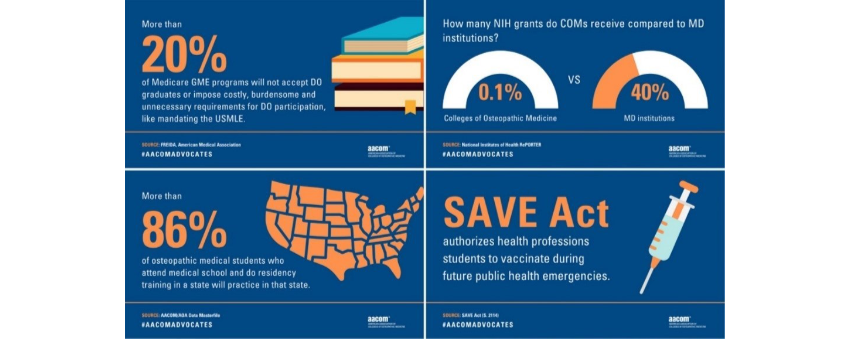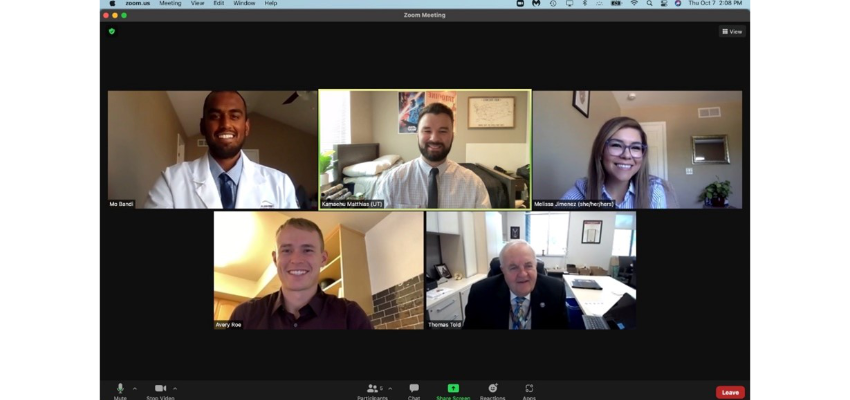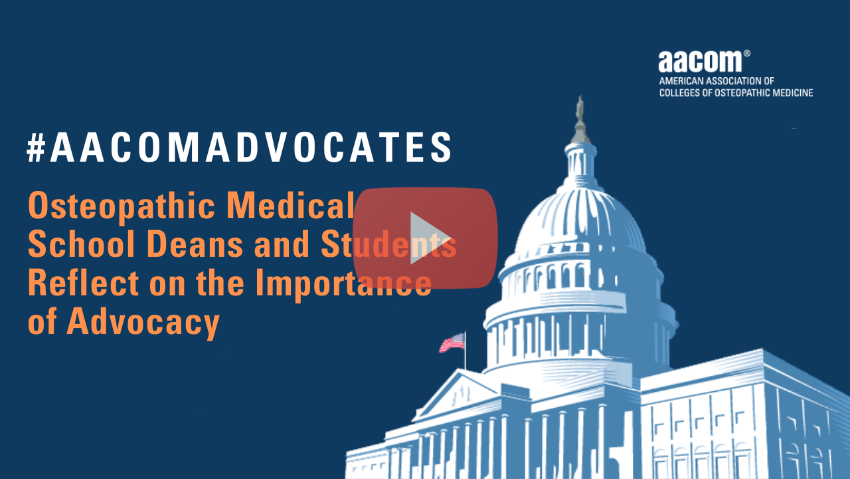#AACOMAdvocates: Osteopathic Medical School Deans and Students Reflect on the Importance of Advocacy
Published January 20, 2022
On October 6-7, 2021, the American Association of Colleges of Osteopathic Medicine (AACOM) hosted AACOM Advocacy Day. During the event, hundreds of osteopathic medical education (OME) community members urged Congress to:
- Remove discriminatory restrictions on DOs at federally funded graduate medical education (GME) programs
- Increase National Institutes of Health (NIH) research funding for osteopathic medical schools
- Strengthen rural GME
- Authorize health professions students to vaccinate during public health emergencies
AACOM spoke with four Advocacy Day participants about their reflections on the event, the importance of advocacy and why everyone in OME should become a strong voice for the profession.
Thomas N. Told, DO, is the regional director of clinical education and acting associate dean at the Rocky Vista University College of Osteopathic Medicine, Southern Utah campus.
Natasha Bray, DO, is the interim dean of the Cherokee Nation campus of the Oklahoma State University Center for Health Sciences College of Osteopathic Medicine.
Veenah Francis is a second-year medical student at the Nova Southeastern University Dr. Kiran C. Patel College of Osteopathic Medicine, Clearwater campus.
Una Hadziahmetovic is a second-year medical student at the Arizona College of Osteopathic Medicine of Midwestern University.
The answers below have been edited for brevity and clarity.
Q: Was AACOM Advocacy Day your first advocacy experience, or are you a more seasoned advocate?
Dr. Told: I have been involved in advocacy ever since the mid-90s, when I was president of the Colorado Society of Osteopathic Medicine, and then national president of the American College of Osteopathic Family Physicians. As dean of the first for-profit medical school in the United States, I found myself in Washington, DC often.
Dr. Bray: I started participating in AACOM and the American Osteopathic Association’s advocacy efforts as a student and have remained engaged for most of my professional career. I think it's very important for us to advocate for issues affecting OME and the health of our patients. We need to put those issues at the forefront, so they don't get forgotten.
Veenah: AACOM Advocacy Day was my first advocacy experience. I previously thought that I didn't want to get involved with politics, but my school’s administration reached out to ask if I’d like to participate. I agreed and it was a great experience, so thank you!
Una: I had a similar experience to Veenah. I represent my school on AACOM’s Council of Osteopathic Student Government Presidents as their legislative representative, so my dean reached out and asked if I wanted to join. This was my first advocacy experience, and it was awesome! I think it even changed my career trajectory because of how much it interests me.
Q: Of the four issues you advocated for on October 7, which resonated with you most strongly? If it’s more than one issue, or all four, feel free to elaborate beyond just one!

Dr. Told: As a rural western state, rural GME is critically important to us. Our mission is to provide physicians in rural areas and a lot of times the rules are stacked against us. Most of the four students in our group were very passionate about rural advocacy, which was well received by many of the staffers we met with. Because we were so passionate about that I think we advocated strongest for it.
Dr. Bray: Being in Oklahoma, obviously rural GME is important to us. Looking at how we expand and support training and practice in underserved communities is something we work on often with Oklahoma’s delegation. The issue that struck home the most with me personally, though, was the concept of DO parity. It's unacceptable for our students to feel like they must take two sets of licensing exams to be successful within the GME arena. Licensing exams are to ensure public safety. They're about making sure physicians have minimal competency to practice. They were never designed or developed to be used as gatekeepers to GME training. Allowing them to be used in a discriminatory fashion to keep students out of certain specialty programs is fundamentally unfair, especially when those programs are being funded by taxpayer dollars.
Veenah: I think it's so funny that we're having to fight for vaccine privileges when it’s so simple to be trained to vaccinate. During my two gap years before medical school, I worked in a pediatric office where we gave vaccines all the time, five in one go sometimes, and it was such a simple, helpful thing that we were able to do. Especially during a pandemic when there's a need for more vaccinators, it’s important to be able to trust your next generation of health professions students to administer vaccines. I also found the NIH funding issue to be very interesting. I am glad that we're addressing this issue because if we make up 25 percent of graduating medical students, it's very unfair that our institutions receive only 0.1 percent of NIH grants. So many students on my campus, not all, but so many are interested in starting research projects and becoming physician researchers. Creating these opportunities will give us traction as a style of medicine and help us bring osteopathic medicine to the forefront as a standard of care.
Una: All four issues struck a chord with me. Like Veenah was saying, it feels like we are losing out on so much beneficial research that could be done at osteopathic medical schools, not only for osteopathic manipulative treatment but also for medical research or basic science research. I was shocked with the disparity. It's a shame that our schools get only 0.1 percent of NIH funding compared to 40 percent for our MD counterparts. Also, as Dr. Bray and Dr. Told discussed, Arizona is a rural state, outside of the big metro areas of Phoenix and Tucson. It's important to make sure that we provide proper healthcare availability to these rural communities. My group spoke a lot about that during our meetings, especially since at Midwestern, all third-year students do rural rotations, and we also have residencies in rural Arizona. And like Veenah, I also think it’s ridiculous that health professions students couldn’t vaccinate before the pandemic. I was able to help with the vaccination efforts at the Midwestern clinics and it was amazing to have that opportunity, but it was also a training process that we received very early on in our first year—I believe it was within the first two months of medical school. Finally, as a student who is going to apply to residencies in a couple of years, I thought that the GME parity for DOs issue was something we can improve. Hopefully all residency programs that are being funded by taxpayer dollars will no longer have those restrictions requiring us to take USMLE. It's a financial, emotional and mental burden for us to have to take two licensing exams in order to be considered for some residency spots.
Q: Which issues resonated most strongly during your congressional visits?
Dr. Told: The rural GME issue for sure. Congress is tuned in to the rural access problem. They understand that 44 percent of the country’s population lives outside of metro areas and yet we have a health system that is designed mainly for metro areas. I think what we must do, and what Congress is asking us to do, is to give them some real-time, on-the-ground solutions. This is a problem that's existed ever since I’ve been advocating in Congress, so you know it's something that we need to continue to work on.
Dr. Bray: I was really surprised by how fast they picked up on the concept of parity around the licensing exams and how they are being used as selection criterion to keep people with certain degrees out of certain residency programs. Two or three of the offices we met with really grabbed hold of that and were interested. I think they were looking at it through the perspective of, you know, Oklahoma needs doctors and if we're limiting people's training opportunities, we're potentially limiting communities from meeting their healthcare needs. Rural issues are also always going to be big in Oklahoma and I think that's true for a lot of our schools. If you look historically at where osteopathic schools are, they tend to be in rural communities or rural adjacent communities. Looking at how we train physicians to serve underserved populations is an issue that we're always going to have traction on.
Una: One of the staffers who we met with had a father who was a DO, so she was very familiar with the GME parity issue and agreed that it needs to change. Almost every person we met with was shocked that DO students feel pressure to take two different licensing exams when, as Dr. Bray mentioned, licensing exams are never meant to be used as a gatekeeper for GME positions, but test for minimal competencies. That issue really resonated with a lot of the staffers we met with, along with the rural GME issue, because Arizona is a rural state.
Q: Why is advocacy important, and why should everyone in the OME community advocate?
Dr. Told: I think advocacy is very important because we have a representative government. If you don't have your voice heard, then you're not going to be represented. You need to be prepared to meet often with your legislators and have a clear message as to what they need to do. Legislators rely on experts from their district. As physicians, we become the local health experts that legislators lean on.
Dr. Bray: I couldn’t agree more with Dr. Told. We build advocacy up in our minds to be something bigger than it is. As members of the osteopathic profession, as educators, as students and as physicians, we play an important role in caring for our communities, promoting health and creating educational systems that do both. If we are not advocating for ourselves and the values we contribute as we work to provide better care for patients in a more meaningful way, then we're missing an opportunity that's critical to what we are responsible for—helping people live happy, healthy and productive lives.
Veenah: It's so simple for students to start getting involved in advocacy. If every medical student were to take a few minutes to start spreading awareness or take a few hours on AACOM Advocacy Day to talk to their congressmen and women, that would make such a difference. I was so surprised by how responsive congressional offices were to our requests. They genuinely seemed interested and committed to help, and as a student, that was exciting to see. Having a direct line to people who can make a difference for OME was really inspiring. Simply taking a few hours out of my day made such an impact. If we can continue empowering more people to take a few hours to advocate, we can make little steps in the bigger picture and that's so important.
Una: Before this experience, I thought advocacy would be some big, huge event, but I realized that if me and a couple other people from my school speak to our congressmen and women, they would be genuinely interested. It was eye-opening to see that a short, 20-minute meeting could make that big of an impact. As medical students, it’s important to learn about advocacy because in the future, we will need to advocate not only for our patients but for ourselves and our colleagues. This is the best time to be an osteopathic medical student and that's because of the advocacy of previous generations of osteopathic physicians. We don't face the same adversity they did. We have them to thank for the position we are in now, and I want to make a similar difference for future osteopathic medical students.
Q: Did AACOM Advocacy Day inspire you to continue advocating in the future or to encourage others to advocate?

Dr. Told (bottom right) with RVUCOM’s Advocacy Day participants
Dr. Told: I certainly enjoyed the old advocacy days when we went to Washington, DC and had the in-person office meetings, even though we had to walk 10 miles from one side of Capitol Hill to the other. If AACOM Advocacy Day taught me one thing, it’s that virtual advocacy can be very effective. I have to say, since AACOM Advocacy Day, I have communicated with my Senators and congressmen and women a lot more virtually than ever before, and I think, honestly, we've seen some results from that. A well-organized effort like this shows you how valuable virtual advocacy can be. My compliments to AACOM for pulling off a virtual advocacy event that was very successful.
Dr. Bray: This was my first time participating in an advocacy day in the role of a dean. It was fascinating and interesting to watch our students develop the skills and confidence to talk about issues and engage with Members of Congress. I know how they felt prior to the experience and the questions they were having, so to see the growth they made in a very short period, to see them go from a lack of confidence and a lack of understanding to become so polished, so professional and so engaged, and to maintain that engagement with staffers through post-event follow ups, was just amazing. And I agree with Dr. Told. You know, historically, we've gone to DC, and I think that’s still important, but using technology, which this event proved was possible, really allows us the opportunity to engage students, to develop them as leaders and advocates and support them in a way that's comfortable to them, which may not mean getting on a plane and going to DC. It may mean engaging through social media platforms, email or conference or video calls. It was exciting to see advocacy work in a different way. It challenged how we traditionally thought about relationship building and it gives me a lot of hope for what we're able to do and who we can engage.
Veenah: While this was my first advocacy experience, it certainly won't be my last. I don't necessarily know where I’ll find the time to do it all, but I know how important it is and I really enjoyed sharing this experience with my peers and friends. Advocacy can help students gain the comfort and confidence to discuss issues that are important to them, which I feel is the easiest way to be an effective advocate. When you talk about how important something is to you, people see your passion. The more students who do that, the better it will be. I’m very excited not only to continue advocating myself, but to continue inspiring my fellow classmates to do it as well.
Una: Like Veenah, this was my first advocacy experience, but it won't be my last. It helped me realize that one voice can make a difference, and if you have more voices saying the same thing, you can make a stronger impact. This whole event went so smoothly, and AACOM makes a great effort to engage students, especially through the Action Center. When we get emails that say, “Click here to send a letter to your representative or senators,” that’s just a small, quick action we can take as students. I hope that, throughout my career, I can continue to advocate for myself, my peers, my colleagues and my future patients.
AACOM thanks Dr. Told, Dr. Bray, Veenah, Una and everyone else who took part in AACOM Advocacy Day. Your advocacy makes an important difference.
To join them in advocating for AACOM’s priority issues, please visit our grassroots Action Center. Subscribe to AACOM’s biweekly Washington Insider newsletter for policy updates and advocacy opportunities.

